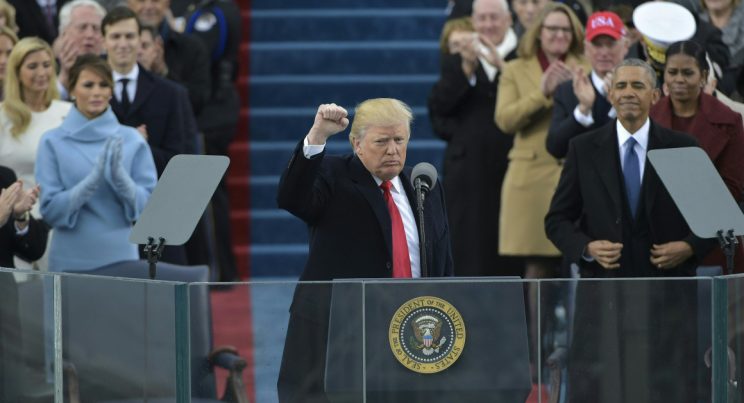Hesston College continues to drive ahead in new political climate

By Mackenzie Miller – Horizon News & Features Editor
Law enforcement, gun owner’s rights, and a disappearing climate change policy page.
The above pledges were the first made by Donald Trump in his inauguration speech and reinforced over the last few days as Trump signed executive actions.
Missing from the list are a few of the policies that characterized the Obama administration: the Affordable Care Act and protections regarding undocumented immigrants.
As President Barack Obama steps out of office, the transition to a Trump administration clearly represents a significant shift in policy and priorities from the previous eight years.
But how will this shift impact a small, liberal-arts college in the plains of Kansas?
As students pursue degrees in all fields, ranging from the health and sciences to the performing arts, what does it mean to continue studying along the lines of Hesston College’s outcomes?
One of those, “understanding human cultures and the natural world,” is an objective that Marelby Mosquera, biology and chemistry faculty at Hesston College, takes very seriously, especially in this political climate. In fact, throughout the presidential election, Trump’s views on climate change were questioned. Eventually, Trump told Fox and Friends, “Well, I think the climate change is just a very, very expensive form of tax.”
But Mosquera says little will change in how she chooses to educate her students on the environment. She will continue to rely on fact-based resources and information. And she doesn’t pull any punches.
“Perhaps, this well researched and supported evidence provided by more than 200 scientific organizations from around the world, might not be enough for the president-elect and climate skeptics that are moving into the White House.”
Mosquera remains dedicated to environmental sustainability as a focus in her classroom.
“Will I stay quiet and not educate students as global citizens and stewards of the earth? No! Will I throw away scientific evidence-where facts are valued and research appreciated? No! Without apologies, I will continue presenting information in regards to global climate change in all of my science courses.”
Another promise made by Trump, repealing the Affordable Care Act, got traction in mid January when the House voted on a measure that would start the process. The nursing faculty at Hesston College compiled their thoughts on current and future health care legislation. They responded via email, emphasizing their patient-first approach to teaching health care policy.
“While enrolled, students will review the pros and cons of the Affordable Care Act from a nursing and a patient advocacy perspective. As future RNs, students will be encouraged to find ways of being active participants in the legislative process, helping to effect positive change. The perspective of the nursing department has been, and will continue to be, ‘Which health care plans or policies will be best for the patients we serve (rather than which plan benefits insurance companies or hospitals)?’ We believe that nurses are first and foremost, patient advocates.”
In an entirely different field of study, Professor of English, Dr. Donovan Tann, emphasized the role of the English and literature in addressing deep divides between people.
“I believe that English studies has a lot to offer a fractured society uncertain how to forge common ground. Our work affirms the value of every voice and asks us to separate myth from fact. In considering others’ stories and perspectives, we try to cultivate empathy and come to understand the limitations of our own perspectives.”
Also seeking to find common ground is Rachel Jantzi, theatre instructor at Hesston College. She stresses the importance of theatre more than ever as Trump has proposed cuts to the National Endowment for the Arts and National Endowment for the Humanities.
“The new administration is sending a strong message that these organizations are a waste,” Jantzi said. “I will feel compelled to tie what we do in the theatre to the campus and community even more intentionally than I already do. I will want to do shows that may at times challenge our thinking which tends to create discomfort. But I also want to bring people together and create more conversations.”
Conversations drive us to action. That is the message resounding throughout the campus of Hesston College. It is the message that incoming president of Hesston College, Dr. Joe Manickam, who recently attending an interfaith forum at Payap University’s Institute of Religion, Culture & Peace, where he serves as president.
“I wish students, faculty, and staff from Hesston College could have been at the event since I believe these types of events would offer us a glimpse into what I see as a response to this question of political discourse,” he said.
However, Manickam does not stop there. He leaves this challenge:
“Discourse (political or otherwise) is important, but merely a first step. For discourse to have value, it must move us to action. And our action must lead us to mutual transformation – transformation of other and transformation of self.”



